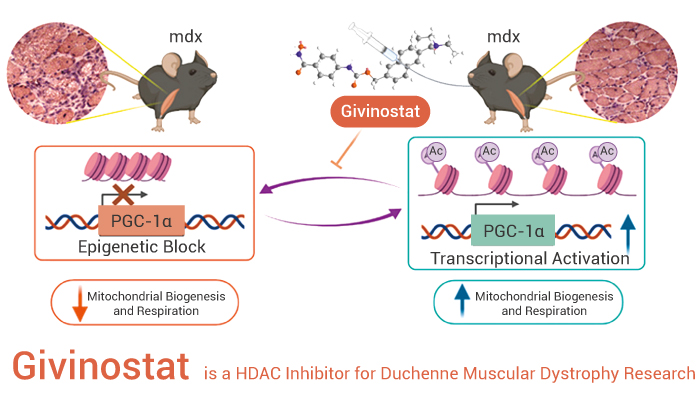HDACs (Histone deacetylases) are a class of enzymes that remove acetyl groups (O=C-CH3) from an ε-N-acetyl lysine amino acid on ahistone. HDACs allow the histones to wrap the DNA more tightly. This is important because DNA is wrapped around histones, and DNA expression is regulated by acetylation and de-acetylation. HDACs play a key role in the epigenetic regulation of gene expression. In addition, elevated expression or activity of HDACs is implicated in the development and progression of cancer. Inhibition of HDAC enzymes results in increased histone acetylation, th HDAC ereby inducing an open chromatin conformation and transcription of previously dormant genes.
In humans, there are 18 HDAC enzymes that use either zinc- or NAD+-dependent mechanisms to deacetylate acetyl lysine substrates. The Class I Rpd3-like proteins (HDAC1, HDAC2, HDAC3, and HDAC8); the Class II Hda1-like proteins (HDAC4, HDAC5, HDAC6, HDAC7, HDAC9, and HDAC10); the Class III Sir2-like proteins (SIRT1, SIRT2, SIRT3, SIRT4, SIRT5, SIRT6, and SIRT7); and the Class IV protein (HDAC11).

Givinostat (also known as ITF-2357) is a potent and orally active HDAC inhibitor with broad anti-inflammatory properties.
Givinostat inhibits both Class I and II HDACs and reduces caspase-1 activity in human peripheral blood mononuclear cells and the secretion of IL-1β and other cytokines at 25-100 nM. Moreover, Givinostat suppresses Lipopolysaccharide (LPS)-induced cytokines such as TNF-α, IL-1 and IL-6, and interferon. Importantly, Givinostat has the potential for the study of juvenile idiopathic arthritis, Hodgkin’s lymphoma, and polycythemia. For example, in mice with inducible or spontaneous diabetes, Givinostat (1.5 mg/kg/day) protects the insulin-producing islets.
In addition, Givinostat shows anticancer and antifibrotic activities. Givinostat regulates the acetylation of NF-κB and SOD2, thus inhibiting hepatic stellate cell proliferation and inducing apoptosis. Moreover, Givinostat reduces the protein expression of CDK4, CDK6, and cyclin D1, whereas expression of p21 and p57 is significantly increased. Besides, Givinostat (5 mg/kg) markedly less collagen deposition and improves fibrosis in the mouse models of liver fibrosis.
To sum up, Givinostat is a potent and orally active HDAC inhibitor with anti-inflammatory and anticancer properties.
References:
[1] Suzhao Li, et al. J Biol Chem. 2015 Jan 23;290(4):2368-78.
[2] Yu-Gang Wang, et al. World J Gastroenterol. 2015 Jul 21;21(27):8326-39.